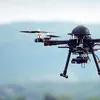New Drone Policy 2021: India to become global drone hub by 2030, says govt
Drones have applications in multiple areas like ecommerce, healthcare, emergency response, etc. 10 things one must know about India's new drone rules 2021.
The central government has liberalised drone rules with the vision to make India a global drone hub by 2030. At present, there are around 200 startups that are part of the drone ecosystem in India, and we might see drone taxis coming up soon.
Startups like Flipkart, Dunzo, and Swiggy have already started pilot projects for deliveries through drones.
Drones have immediate applications in multiple areas such as ecommerce, industries like mining, healthcare, emergency response, etc.

The revised norms will make India a $5 billion drone market in the next three years, said Vipul Singh, Co-founder and CEO, Aarav Unmanned Systems.
Let’s take a look at the relaxed norms:
- The coverage of drones has been increased from 300 kg to 500 kg, including heavy payload-carrying drones and drone taxis.
- The new drone rules remove the security clearance before any registration or licence issuance. The number of forms has been reduced from 25 to 5, and types of fee has been reduced from 72 to 4.
- Interactive airspace maps with green, yellow, and red zones shall be displayed on the digital sky platform within 30 days of the publication of these rules. No permission will be required for operating drones in green zones.
- A drone promotion council will be set up by the government, with participation from academia, startups, and other key stakeholders to facilitate a growth-oriented regulatory regime.
- No remote pilot licence is required for micro drones (for non-commercial use) and nano drones.
- Now, there is no restriction on foreign ownership in Indian drone companies and import of drones will be regulated by DGFT. The requirement of an import clearance from the DGCA has been abolished.
- The DGCA shall prescribe drone training requirements, oversee drone schools, and provide pilot licences online.
- Remote pilot licence to be issued by DGCA within 15 days of the pilot receiving the remote pilot certificate.
- Manufacturers and importers may generate their drones’ unique identification number on the digital sky platform through the self-certification route.
- The maximum penalty for violations is reduced to Rs 1 lakh. Drone corridors will be developed for cargo deliveries.








